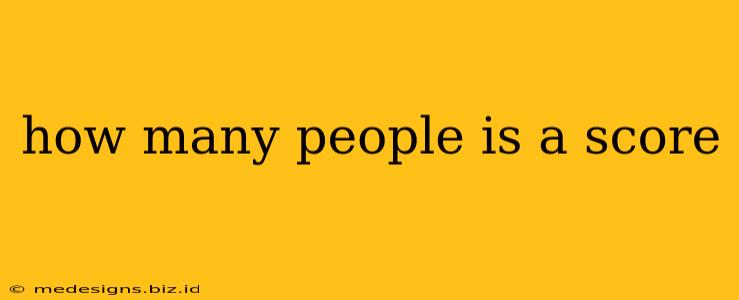The word "score" might seem straightforward, but its meaning when referring to a number of people is surprisingly nuanced and depends heavily on context. It doesn't have a single, universally accepted numerical equivalent. Let's explore the different ways "score" is used.
The Biblical Meaning of Score: Twenty
The most common and historically rooted definition of a score is twenty. This usage stems from the archaic meaning of "score" as a tally mark, often used in accounting and record-keeping. Biblical texts frequently use "score" in this way, leading many to associate the term directly with the number 20. For example, you might hear someone say, "a score and ten years ago," referring to thirty years.
Examples of "Score" Meaning Twenty:
- "A score of soldiers marched into battle." (Meaning 20 soldiers)
- "They celebrated their anniversary after a score of years." (Meaning 20 years)
Score in Other Contexts: Ambiguity and Flexibility
Outside of its strictly biblical and historical usage, the meaning of "score" becomes less precise. It often acts as a general, imprecise term to signify a relatively large, but undefined number. In this case, it doesn't necessarily represent a specific quantity.
Examples of "Score" as an Indeterminate Number:
- "A score of people attended the rally." (This suggests a substantial number, perhaps between 20 and 50, but it's not exact).
- "He received a score of emails this morning." (This suggests a large number of emails, not necessarily exactly 20).
Distinguishing Between the Meanings: Context is Key
The crucial factor in understanding the meaning of "score" is context. If the context suggests a precise numerical value, it's likely referring to twenty. If the context is less formal or implies a general large number, then "score" functions as an imprecise quantifier.
Using "Score" in Modern Writing: Clarity First
While the flexibility of "score" might be charming in some situations, prioritizing clarity in your writing is essential. In most cases, using a more precise number (e.g., "twenty," "thirty," "many," or "a large number") avoids ambiguity and ensures your message is understood without confusion.
In summary: While "score" traditionally means twenty, its modern usage is often less precise, functioning as an approximate and flexible term for a sizable quantity. Understanding the context is crucial to interpreting its meaning. For clear communication, however, choosing a more specific numerical description is generally recommended.
